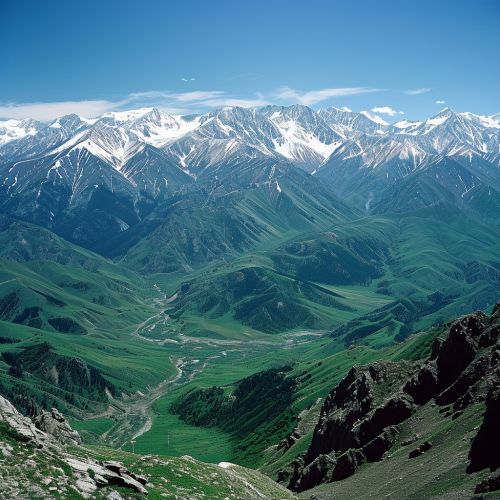Tian Shan
Geography
The Tian Shan is a large system of mountain ranges located in Central Asia. The name translates to "Mountains of Heaven" or "Heavenly Mountains" from Chinese. The system extends approximately 2,800 kilometers from east to west through several countries, including China, Kazakhstan, Kyrgyzstan, and Uzbekistan. The highest peak, Jengish Chokusu, reaches an elevation of 7,439 meters, making it the highest point in Kyrgyzstan and the 46th highest peak in the world.

Geology
The Tian Shan system is part of the larger Himalayan orogenic belt, which was formed by the collision of the Indian and Eurasian tectonic plates. The mountains are primarily composed of sedimentary, metamorphic, and igneous rocks. The range is known for its rich mineral resources, including significant deposits of gold, coal, oil, and natural gas.
Climate
The climate of the Tian Shan varies greatly depending on altitude and latitude. The lower slopes of the mountains have a dry continental climate, characterized by hot summers and cold winters. Higher elevations experience an alpine climate, with cooler temperatures and significant snowfall. The mountains also influence the regional climate by blocking the movement of air masses, creating a rain shadow effect on the leeward side of the range.
Flora and Fauna
The Tian Shan is home to a diverse array of plant and animal species. The lower slopes are covered in grasslands and shrublands, while the higher elevations support alpine meadows and coniferous forests. The range is also home to several endangered species, including the snow leopard and the Tian Shan wapiti.
Human History
The Tian Shan has been inhabited by humans for thousands of years. The region has played a significant role in the history of Central Asia, serving as a crossroads for several major trade routes, including the Silk Road. Today, the mountains continue to be a vital resource for the local population, providing water, timber, and mineral resources.
Conservation
Several national parks and nature reserves have been established in the Tian Shan to protect its unique ecosystems and biodiversity. However, the region faces several environmental challenges, including climate change, deforestation, and overgrazing.
